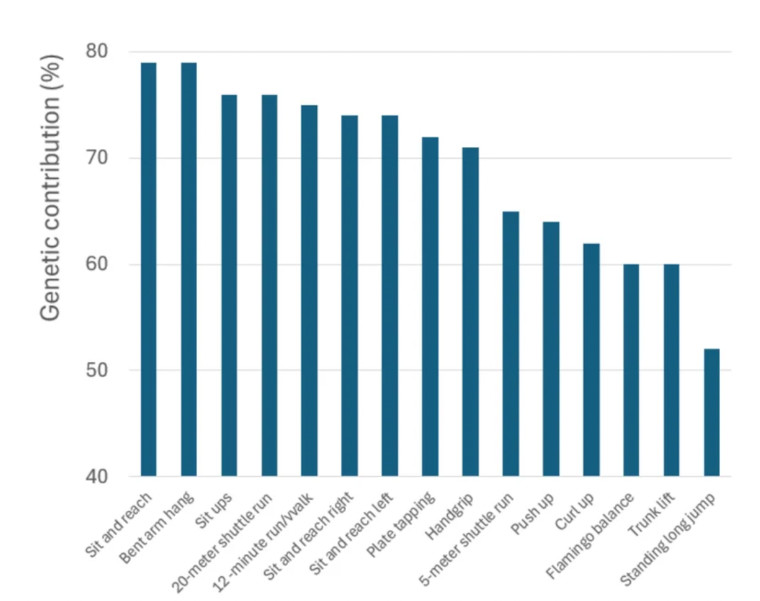Some people are born more (or less) athletic than others. And while natural talent will always be a real thing, some fitness and athletic traits may be more about genetics than we thought.
- A new study published in Medicine & Science in Sports & Exercise in July suggests this to be the case, and the results might surprise you: Flexibility appears to be the fitness trait that is most determined by your genes, while explosive power is arguably the least.
[Related: Best Leg Exercises]
What the Study Says
The international research team based at the University of Helsinki analyzed 198 pairs of Portuguese twins between the ages of 6 and 18.
All of the participants were put through a battery of 15 fitness tests to determine how much variability existed between each twin.
- The tests included the flamingo test (balancing on one leg), a sit-and-reach test, a standing long jump test, a sit-up test, a push-up test, a shuttle run test (the Beep Test), and a 12-minute run or walk, among others.
The results: The test with the biggest genetic contribution (meaning twins had the most similar scores) was the sit-and-reach flexibility test, where the genetic contribution was determined to be 79%.
According to the researchers, a 79% genetic contribution is similar to or slightly lower than the genetic predictor for a person’s height and childhood BMI.
- On the other side, the test where genetics showed to contribute the least was the standing long jump test (52%).
The other 13 tests all fell somewhere between 52% and 79% in terms of their genetic contribution to the performance result.

[Related: Best Mobility Exercises]
One Big Thing
When it comes to who finished with the best scores overall, the three tests that most correlated with each other were the push-up test, the standing long jump test, and the Beep Test. Thus, if you want to know who will score well overall, these three tests proved to be the most effective predictors.
The Big Picture
Genetics plays a role in fitness and athleticism — that’s not news. However, what is perhaps surprising is that in the standing long jump, genetics played the smallest role in determining performance.
- There’s a common belief that you’re born with fast-twitch or slow-twitch muscles. That some people are born with the ability to jump, while others are vertically challenged. But this science suggests there might be hope for those of us who feel like explosiveness and power eludes us and that there’s nothing we can do about it.
Then again, anyone who has committed to CrossFit knows that hard work can improve all fitness domains.
That said, if you can’t touch your toes, this research suggests it just might take extra hard work to get you there.
More CrossFit Stories
- Your Guide to the Major 2024 CrossFit Offseason Events
- Northern California Classic Partners With PFAA to Approve Open-Water Swim Event
- “Many Mixed Emotions”: Emily Rolfe on Her CrossFit Games Podium Finish
Featured image: @sitandreach / Instagram